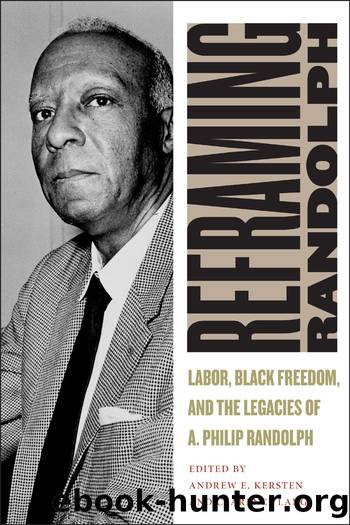Reframing Randolph by Andrew E. Kersten

Author:Andrew E. Kersten
Language: eng
Format: epub
ISBN: 9780814764640
Publisher: NYU Press
* * *
Historians have often treated A. Philip Randolph as the moral compass of the black freedom struggle and union movement in America. As marched Randolph, these studies imply, so marched the movement. Thus, few historians have considered what the NNC accomplished after Randolph departed from the organization in April 1940; they assigned it to the dustbin of history and dismissed it, in Cold War terminology, as a âCommunist Frontâ organization. Moreover, even studies of Randolph during his reign as president of the NNC tend to focus on the successes of the Brotherhood of Sleeping Car Porters over the exponentially more significant organization of black workers into major industrial unions in the CIO.62
Taking into account Randolphâs symbolic importance, charismatic leadership, and practical work on behalf of the NNC movement in the late 1930s changes the perspective on him as âMr. Black Labor,â making Randolph not necessarily the only leader worth highlighting, and even destabilizing the assumption that his leadership consistently represented the vanguard of the movement for economic security and civil rights among African Americans. Rather than demeaning Randolph, this approach complicates him as a civil rights spokesman, making him all the more human and the history of his leadership all the more instructive. Focusing on the period from 1935 to 1940, this chapter shows that Randolph subsumed his feelings about working in a coalition that included Communists for a few short years, and it explains why he abruptly changed direction by interrogating his larger vision for the labor movement as a vehicle for civil rights. His decisionsâboth in terms of the AFL and backroom conferences with the Roosevelt administrationâreveal that he was in equal parts strategically cautious and militant.
This historical framing also helps to explain why Shelton Tappes, a fellow trade unionist and NNC leader in Detroit, espoused such a critical perspective on Randolph. In a 1967 interview with NAACP labor secretary Herbert Hill, Tappes stated that Randolphâs âappeal has always been more to the white-collar class than to the working class.â He continued:
Download
This site does not store any files on its server. We only index and link to content provided by other sites. Please contact the content providers to delete copyright contents if any and email us, we'll remove relevant links or contents immediately.
The Hite Report on Shere Hite by Shere Hite(1933)
The One Percenter Encyclopedia by Bill Hayes(1699)
Benjamin Franklin: An American Life by Walter Isaacson(1630)
Benjamin Franklin : an American Life by Walter Isaacson(1324)
God Is Not Great by Christopher Hitchens(1189)
Book of Obituaries by Ann Wroe(1183)
Who's Who in the Age of Jesus by Geza Vermes(1136)
On Sparta (Penguin Classics) by Plutarch(1098)
A Treasury of Royal Scandals by Michael Farquhar(1029)
Bloodletters and Badmen by Jay Robert Nash(1015)
Agatha Christie Murder in the Making by Agatha Christie & John Curran(1008)
Heroes by Paul Johnson(959)
The Fortunate Pilgrim by Mario Puzo(939)
Men in Dark Times by Hannah Arendt(920)
A Dictionary of Political Biography by A Dictionary of Political Biography(918)
Stepping Stones by Dennis O'Driscoll(878)
The Motion of Light in Water: Sex and Science Fiction Writing in the East Village by Delany Samuel R(858)
Agatha Christie's Secret Notebooks by Agatha Christie & John Curran(858)
Devil May Care by Unknown(846)
